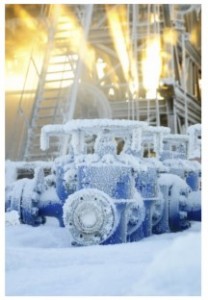Extreme Low Temperature FKM Materials
 Oil and Gas applications typically require rubber seals made from compounds that can withstand high operating temperatures but much of the energy industry operates in climates that experience some very cold weather. These materials are designed not just for low temperatures, but for resistance to gases and fluids encountered in the industry.
Oil and Gas applications typically require rubber seals made from compounds that can withstand high operating temperatures but much of the energy industry operates in climates that experience some very cold weather. These materials are designed not just for low temperatures, but for resistance to gases and fluids encountered in the industry.
Precision Associates Inc. has two FKM materials that have proven to be a good fit for sealing in applications with exposure to frigid temperatures. These materials have outstanding low temperature flexibility and maintain long term sealing force.
- 9705 is a 70+/-5 duro black FKM
- 9905 is a 90+/-5 duro black FKM (RGD resistant and Sour Service)
Low temperature performance can be a very important characteristic of an elastomeric compound. Reducing the temperature of the environment sur-rounding the rubber article will have a negative impact on the rubber proper-ties. With decreasing temperatures, the movements of the molecular chains are reduced. At a certain temperature the molecular chains will no longer be able to move and the rubber loses all its rubber characteristics. The rubber will embrittle and be-come plastic like, reducing or eliminating the ability of the material to act as a seal.
There are several different ways to measure the low temperature properties of a rubber compound. The three most common methods used in the rubber industry are:
Glass Transition (Tg) is the temperature at which a particular rubber compound becomes crystalline and is stiff and brittle. At this point many molecules will be aligned and the compound will cease to be liquid or elastic. Time at a given temperature may also be required as some polymers need time to develop this crystallization. Testing is performed per ASTM E 1640.
Brittle Point is the temperature at which the material breaks upon impact. Testing is performed per ASTM D 1329.
Temperature Retraction is the temperature at which frozen rubber returns to an elastic state.
Testing is performed per ASTM D2137.
Precision Associates typically tests seal compounds for Brittle Point and for Temperature Retraction, specifically TR-10. We can also provide other retraction results if desired. We consider the TR-10 test to be the best indicator for the performance of seals at low temperatures.
Read more about PAI Energy Compounds, B-Lo° Lo-Temp Rubber Compounds, RGD & Extrusion Resistant Compounds, and Electric Submersible Pump Bags.
